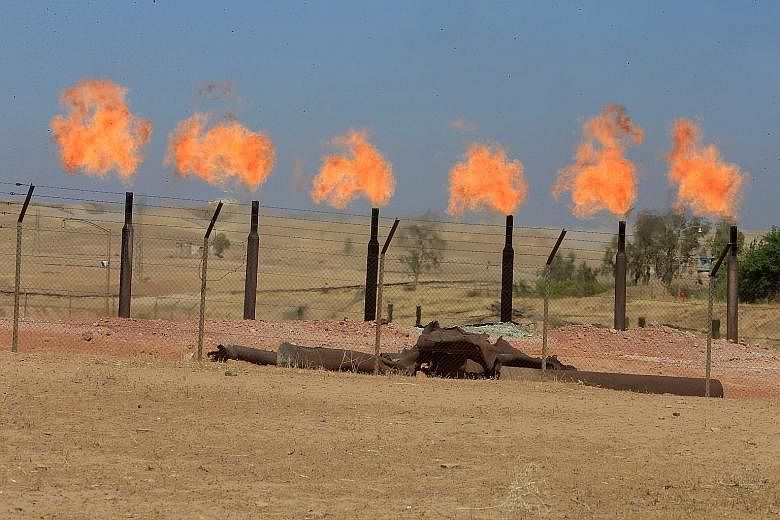BAGHDAD • The latest battle for Iraq's future is unfolding around the country's oldest oil field.
Federal government troops and forces from the semi-autonomous Kurdish region are facing off in Kirkuk province in northern Iraq. Baghdad wants control of the area's oil deposits back from Kurdish forces, who seized the long-disputed area to ward off Islamic State in Iraq and Syria (ISIS) militants in 2014.
The Kurds, who overwhelmingly voted for independence in a referendum last month, see the resources as a financial lifeline for a future state.
Kirkuk's oil, discovered by the forebears of BP and Total in 1927, lies in one of the Middle East's great fields. Its long anticline - the bump in the Earth that trapped the crude - can be seen from the air, running straight through the disputed city of almost a million people.
Crude flowed from Kirkuk 10 years before Saudi Arabia struck oil and two decades before the kingdom found the giant Ghawar field. While the area around Kirkuk now pumps a fraction of Iraq's total output of 4.5 million barrels a day - about 350,000 barrels a day, according to Bloomberg estimates - it remains a valuable prize.
While foreign investments flowed into Iraq's giant southern oil fields after the overthrow of Saddam Hussein, production in the north has been locked in the past.
After suffering years of mismanagement under the former dictator, Iraq's failure to pass and enforce a national oil law and set up lasting revenue-sharing arrangements prevented the disputed areas from benefiting from foreign investment.
The battle is part of a wide power struggle involving Iran and Turkey, both of which have large Kurdish populations and reasons to be wary of independence for Iraq's Kurds.
"The war on ISIS is edging to an end and now the real war starts, the war between the regional powers in order to control resources and define their own areas of influence," said Mr Sami Nader, head of the Levant Institute for Strategic Affairs in Beirut. What is happening in Kirkuk is not just a local Iraqi conflict but also a regional race to establish new boundaries, he said.
The venture that found Kirkuk's oil at the Baba Gurgur well also involved Calouste Gulbenkian, the Armenian entrepreneur who played a starring role in the birth of the Middle East's oil industry.
Gulbenkian was born in the Ottoman Empire, which stretched across modern Turkey and into present-day Iraq. The collapse of that empire in World War I left behind a patchwork of nations across the Middle East, stitching together the diverse ethnic and religious groups that have so often clashed.
In today's Kirkuk, those historic divisions underpin the oil-laced battle threatening to rip apart modern Iraq.
BLOOMBERG

